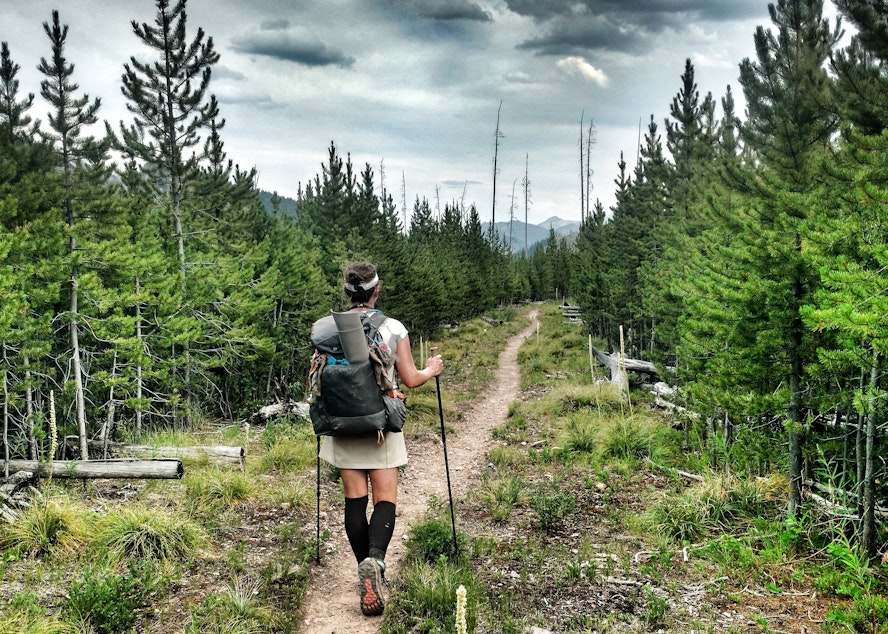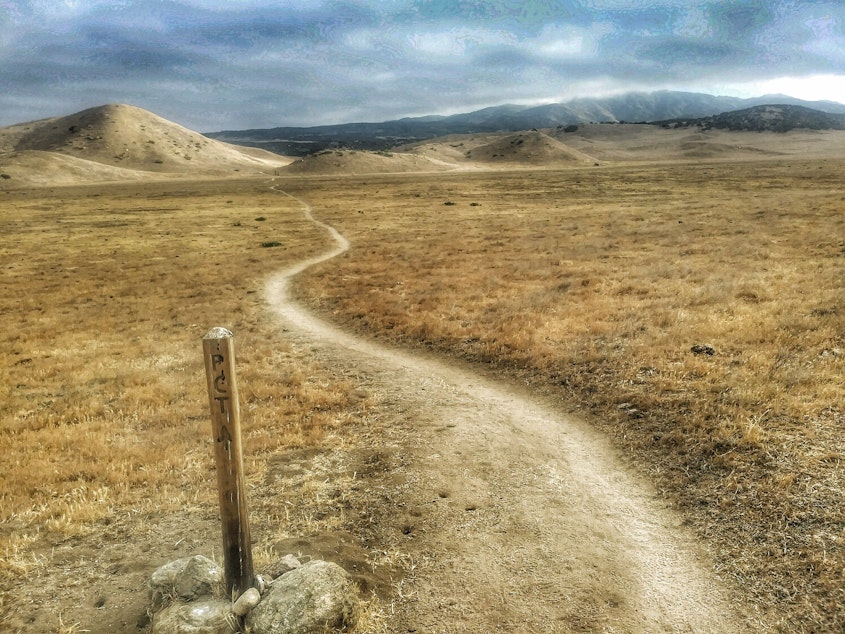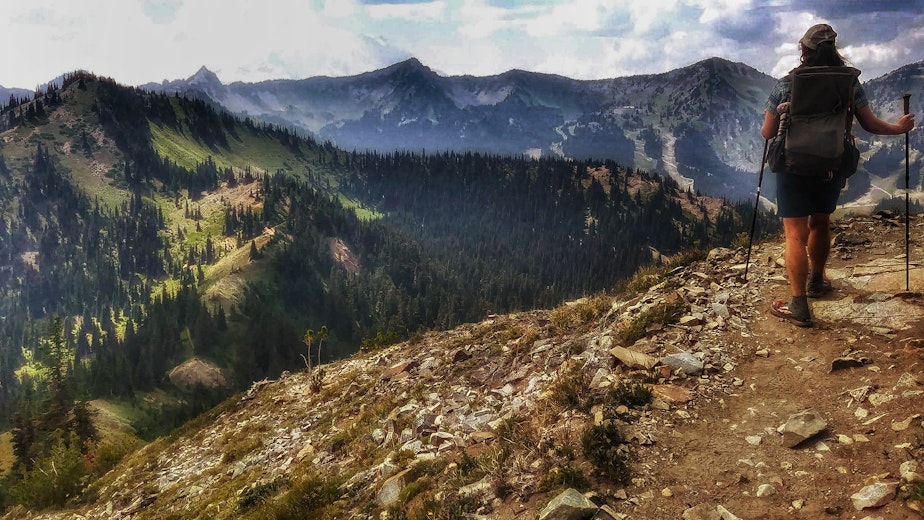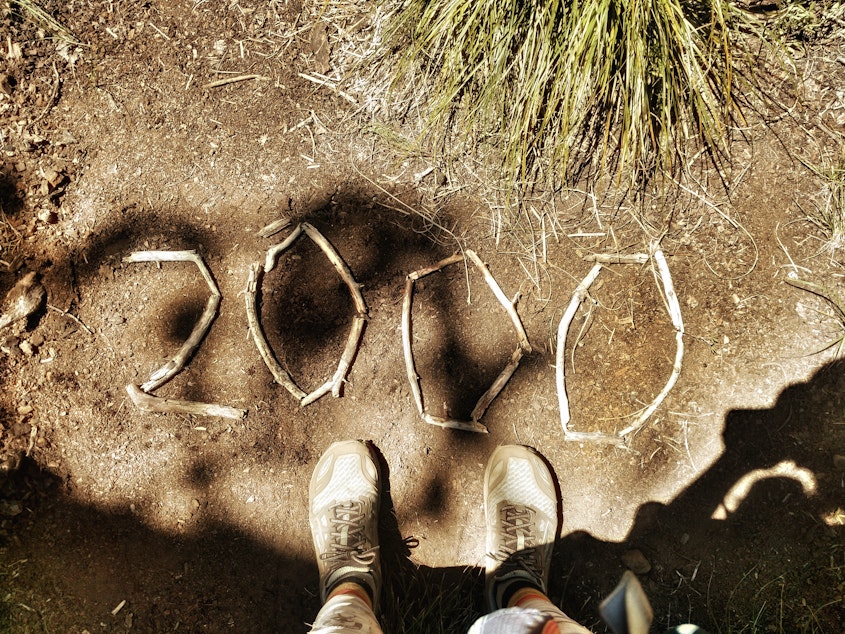She was a couch potato. Then she set a U.S. hiking record

When Heather Anderson started college, she couldn't run around a track.
She calls herself a "reformed couch potato" because, despite not having backpacked before, Anderson decided in 2003 to hike the Appalachian Trail. Now, she's the sixth person and the first woman ever to complete the "Triple Crown" — that's hiking the Appalachian Trail, Pacific Crest Trail, and Continental Divide within a single year.
For perspective, that means Anderson hiked over 8,000 miles, which is like hiking from the farthest northwest point of Washington state down to the furthest southeast point of Florida — twice. Plus, she climbed over a million vertical feet.
She's thru-hiked — that's hiking end to end of a trail in one go — all three famous American trails a total of three times each. (That's a triple Triple Crown, if you're counting.)
Anderson is out with a memoir, "Thirst: 2600 Miles to Home." She joined Bill Radke in conversation about her motivation to be the best on and off the trail.
Heather Anderson on The Record March 11, 2019
Sponsored
Interview highlights have been lightly edited for clarity
When you were in sixth grade, you wrote an essay for your gym class that said, 'If I ever manage to overcome my athletic weaknesses, I want to set a record. Not just any record, but an athletic record.' As a nonathletic kid, why would you want to be super athletic someday?
The whole theme of the essay was what my athletic goals were. Since I didn't have any, I figured I might as well write about something big. It was a bit of hyperbole, but it turned out to be foreshadowing.
Why long distance hiking?
When I was in college, at age 20, I got a job working at the Grand Canyon for the summer. That was where I went on my first hikes and just fell in love with it. It's hard not to fall in love with the Grand Canyon. From there, I just decided I wanted to hike as much as possible. I had heard of the Appalachian Trail and made it my goal to hike that after I graduated from college. From there — I fell in love with thru-hiking, and it's been a passion ever since.
Sponsored

How did you manage to complete these hikes?
I've done them all different ways. The first time I did each trail, it was standard. I showed up and walked end to end. The second time I hiked the Pacific Crest Trail, I did a self-supported, fastest known time, so that means I was out there going as fast as I could and nobody was bringing me supplies. I did the same thing on the Appalachian trail as well.
Why fast? I love hiking, but I've never thought about speed.
It's a different kind of challenge.
Sponsored
At that point in my life, I was going through a lot of different changes, and I felt like there was a lot of internal struggle that I needed to deal with, and a lot of emotional baggage from things I needed to work through.
I felt that changing the intensity of how I went into the outdoors was going to help me work through these issues. It worked, and it did help me. It was my version of intensive therapy, to get out there and push myself really hard physically. That led to emotional pushing as well; it really helped me grow and change.
Are you sometimes running?
No, just walking.
How did you decide to challenge yourself like this?
Sponsored
I'm not even 100 percent sure how I came up with this idea, but when I was out hiking on the Pacific Crest Trail in 2012, I went out and did 900 miles just because I had quit my job and decided I needed to go back to the mountains. I woke up one morning in my tent and was like, I need to set an FKT — a fastest known time. It was just one of those ideas that comes to you.

What's it like to be alone for this amount of time?
You really just let your mind wander as much as it wants or needs to. I liken it to inverted meditation. Most people think of meditation as a practice where you sit very still physically to still your mind. But to me, the walking and especially the repetitiveness of hiking is how I still my body and my mind.
It helps you remove the clutter, especially if you aren't spending a lot of time on your phone or listening to music and podcasts like a lot of hikers do to distract themselves. Sometimes there are days where you need ample opportunity to clear your mind by just being in the moment.
Sponsored
How is the Pacific Crest Trail different from the other two in the Triple Crown?
A crazy amount of the U.S. population lives within a one hour drive of the Appalachian Trail, which makes it very accessible. The trail is rocky and rooty. But the Pacific Crest Trail is actually relatively remote, and it's an established, well-graded footpath all the way from Mexico to Canada.
Continental Divide Trail is also very remote, but even though it's technically complete, a lot of it has posting cairns on a cross country section, or you're still walking on roadways because it hasn't been developed as a trail head for the entire way.
So the Pacific Crest Trail is this great middle ground where it's beautiful, it's complete, it's well-maintained, it's marked, and it's still very remote and wild.

Any advice for Pacific Crest Trail would-be hikers?
Any of the Washington state sections are beautiful to start with. If you're thinking about hiking the entire thing, definitely do your research and get on the Pacific Crest Trail Association website. They have all kinds of planning tools for thru-hikers and section hikers, and read up on what you're going to encounter out there because it is very unique trip an traverses a lot of different environments, from the desert to the high mountains.
Tips for hiking footwear?
I hike in trail running shoes, and I think that most thru-hikers do. There are some people who still use hiking boots, but at the end of the day, what matters is that your feet are comfortable. If you're experiencing discomfort, you're going to be miserable out there.
What's the difference between you with other people and you alone for all that time?
I think that when you're out on the trail by yourself, it gives you this ability to disconnect from a lot of the things we have distracting us in society, and really deal with yourself and be internal with yourself. That's something that I really value. It also teaches you how to be self-reliant and brave because you are by yourself.
That being said, one of the things that's really wonderful about thru-hiking is this trail community or trail family. You're on a common journey that bring you together, and it's a wonderful chance to learn and to have a sense of camaraderie with people you would never have met otherwise.
It sounds very healthy, but you also have suffered some post-trail depression. What's that like?
Post-trail depression is very real and very common. Almost every thru-hiker experiences some level of post-trail depression because it is a very simple, goal-oriented life. You're walking thousand of miles towards a goal for months on end, and then there's always going to be a letdown once you've achieved that goal because this has been your life for so long.
It's kind of like a reverse culture shock when you come back into society after living in the woods, you have to readjust and find a lot of times that your priorities are different or the way you perceive things is different.
Why does thru-hiking mean so much to you?
Because it's not just hiking, it's the fact that I have pursued my dreams. Hiking is what makes me feel happiest and most fulfilled, and I have no regrets.

Produced for the web by Brie Ripley




